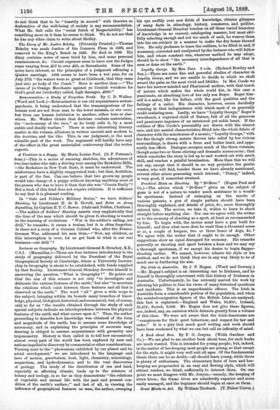Lectures on Geography. By Lieutenant-General R. Strachey, BE., C.S.I. (Macmillan.)—These
are four lectures introductory to the study of geography delivered by the President of the Royal Geographical Society at Cambridge, where a University Lecture- ship in Geography is about to be established, with funds supplied by that Society. Lieutenant-General Strachey devotes himself to answering the question, "What is Geography ?" He points out that the aim of this science is not only "to investigate and delineate the various features of the earth," but also "to ascertain the relations which exist between those features and all that is observed on the earth." The word " all " gives a wide scope to the subject, bringing within its bounds many branches of know- ledge, physical, biological, historical, and economical; but, of course, only so far as "the results obtained through the study of such special subjects indicate an interdependence between the physical features of the earth and what occurs upon it." Thus, the author proceeding to describe how knowledge was obtained of the form and magnitude of the earth, has to assume some knowledge of astronomy, and in explaining the principles of accurate map- drawing is obliged to assume acquaintance with geometry and trigonometry. History is then called in to tell how successively almost every part of the world has been explored by men and nations impelled to discovery by commercial or other considerations. Turning next to the "phenomena exhibited by our planet and its aerial envelopment," we are introduced to the language and laws of motion, gravitation, heat, light, chemistry, mineralogy, magnetism, and hydrodynamics, and to the vast discoveries of geology. The study of the distribution of sea and land, especially as affecting climate, leads up to the sciences of botany and zoology, in so far as they demonstrate "the relations of vegetable and animal life with the past and present con- dition of the earth's surface ;" and last of all, in viewing the influence of geographical features on man, the author, sweeping his eye swiftly over new fields of knowledge, obtains glimpses of many facts in ethnology, history, commerce, and politics. Lieutenant-General Strachey touches on all these varied branches of knowledge in no cursory, cataloguing manner, but most skil- fully selecting enough and not too much of each, he weaves them into his one subject in a manner to make the dry bones thereof live. He only professes to trace the outlines, to be filled in and, if necessary, corrected and readjusted by the lecturer who will follow- him, and whose constant aim, whatever method he may adopt, should be to show "the necessary interdependence of all that is seen or done on the earth."


































 Previous page
Previous page